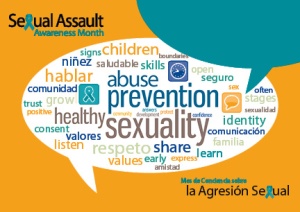Spring Clean Your Health!
February 20, 2013Get Yourself Tested
April 4, 2013If you get your information from TV shows, you may be puzzled about what Sexual Assault (SA) is and what it is not.
Sexual Assault is any coerced, threatened, forced, manipulated, and/or involuntary sexual contact of a person who has not consented. This includes intentional touching, kissing, and oral/anal/vaginal intercourse without consent. A drunk or high person CANNOT legally consent to sexual activity. Sexual assault does NOT only affect women; it can happen to anyone – men, women, teens, children, old and young.
According to the National Sexual Violence Resource Center:
- One in six boys and one in four girls will experience a sexual assault before the age of 18.
- One in five women and one in 71 men will be raped at some point in their life.
- A majority of women, who reported being raped (79.6%), experienced their first rape before 25 years of age and 42.2% experienced their first rape before the age of 18.
- More than 25% of male victims reported their first rape occurred when they were 10 years old or younger.
According to RAINN (Rape, Abuse & Incest National Network) , the nation’s largest anti-sexual violence organization, every 2 minutes someone in the US is sexually assaulted.
Sexual assault is a traumatic event that has a profound and long-lasting effect on each victim. From physical injuries to psychological effects including denial, helplessness, anger, self-blame, anxiety, shame, fear, depression, guilt, promiscuity, and more, sexual assault is not something anyone can just “move on” from.
Prevention
Sexual assault, sexual violence, and rape are far more prevalent in the United States, and the world, than is reported. How can you, and those around you, work together to prevent sexual assault? What steps can you and others take to prevent a sexual assault?
- Walk the walk – be a role model for respectful behavior.
- Talk with your children, your friends, and your family members about healthy sexual development and boundaries.
- Speak up when you see inappropriate behavior.
- Watch for warning signs of sexual assault – sudden changes in behavior or mood, lower grades, social withdrawal, depression.
- If you’ve been assaulted, get help. Talk to someone. Remember it’s not your fault! Talking to someone can really help!
Local hospitals staff are trained to help you. You can get medication to prevent sexual infections and to prevent a pregnancy. Trained nurses can collect evidence that can be used to find and jail your attacker.
Local resources include:
- Safe House Center http://www.safehousecenter.org/ (24 hour hotline)
- Ozone House – 734-662-2222
- Oxygen Youth Help Referral Line – 734-664-0300
National resources include:
- RAINN – 1-800-656-HOPE or online.rainn.org
- National Domestic Violence Hotline – 1-800-799-SAFE (7233)
- National Dating Abuse Helpline – 1-866-331-9474




